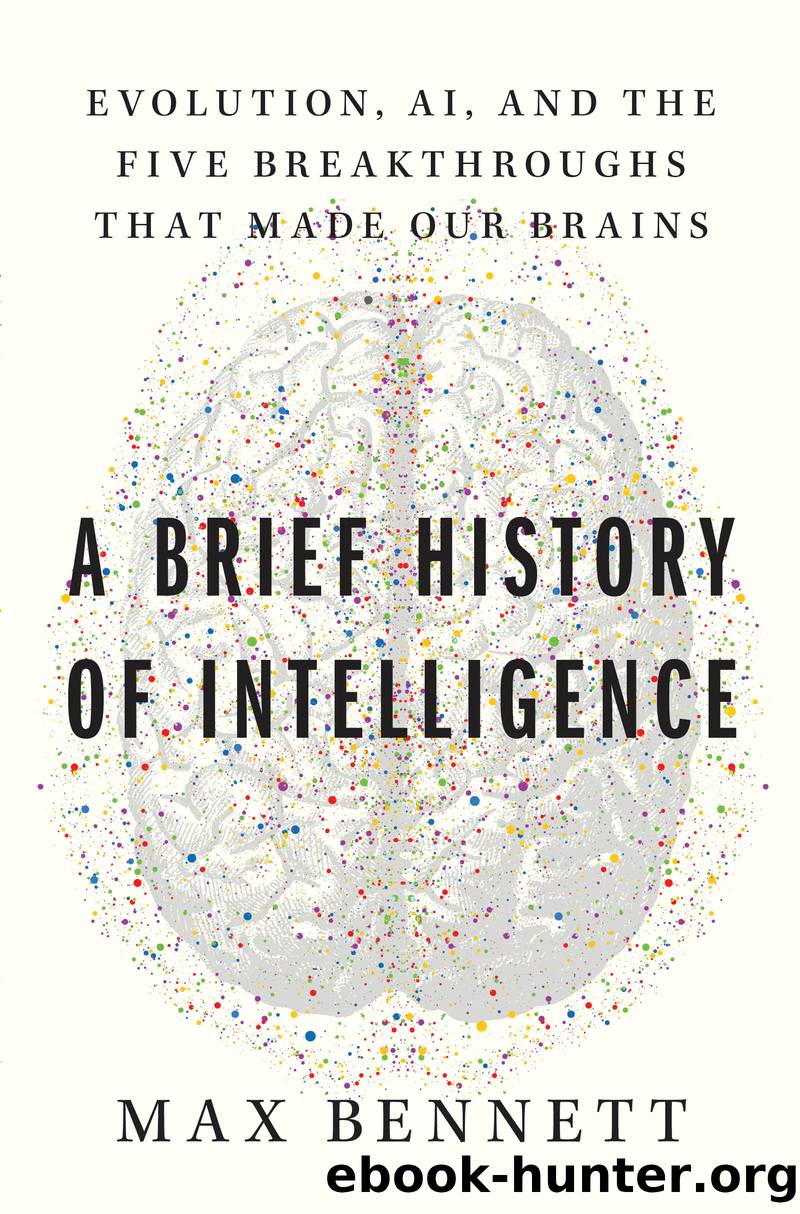A Brief History of Intelligence by Max Bennett

Author:Max Bennett
Language: eng
Format: epub
Publisher: HarperCollins
Published: 2023-08-22T00:00:00+00:00
Summary of Breakthrough #3: Simulating
The primary new brain structure that emerged in early mammals was the neocortex. With the neocortex came the gift of simulationâthe third breakthrough in our evolutionary story. To summarize how this occurred and how it was used:
Sensory neocortex evolved, which created a simulation of the external world (a world model).
The agranular prefrontal cortex (aPFC) evolved, which was the first region of the frontal neocortex. The aPFC created a simulation of an animalâs own movements and internal states (a self model) and constructed âintentâ to explain oneâs own behavior.
The aPFC and sensory neocortex worked together to enable early mammals to pause and simulate aspects of the world that were not currently being experiencedâin other words, model-based reinforcement learning.
The aPFC somehow solved the search problem by intelligently selecting paths to simulate and determining when to simulate them.
These simulations enabled early mammals to engage in vicarious trial and errorâto simulate future actions and decide which path to take based on the imagined outcomes.
These simulations enabled early mammals to engage in counterfactual learning, thereby offering a more advanced solution to the credit assignment problemâenabling mammals to assign credit based on causal relationships.
These simulations enabled early mammals to engage in episodic memory, which allowed mammals to recall past events and actions, and use these recollections to adjust their behavior.
In later mammals, the motor cortex evolved, enabling mammals to plan and simulate specific body movements.
Download
This site does not store any files on its server. We only index and link to content provided by other sites. Please contact the content providers to delete copyright contents if any and email us, we'll remove relevant links or contents immediately.
Periodization Training for Sports by Tudor Bompa(8273)
Why We Sleep: Unlocking the Power of Sleep and Dreams by Matthew Walker(6726)
Paper Towns by Green John(5191)
The Immortal Life of Henrietta Lacks by Rebecca Skloot(4588)
The Sports Rules Book by Human Kinetics(4388)
Dynamic Alignment Through Imagery by Eric Franklin(4217)
ACSM's Complete Guide to Fitness & Health by ACSM(4060)
Kaplan MCAT Organic Chemistry Review: Created for MCAT 2015 (Kaplan Test Prep) by Kaplan(4013)
Livewired by David Eagleman(3775)
Introduction to Kinesiology by Shirl J. Hoffman(3774)
The Death of the Heart by Elizabeth Bowen(3622)
The River of Consciousness by Oliver Sacks(3604)
Alchemy and Alchemists by C. J. S. Thompson(3522)
Bad Pharma by Ben Goldacre(3428)
Descartes' Error by Antonio Damasio(3279)
The Emperor of All Maladies: A Biography of Cancer by Siddhartha Mukherjee(3163)
The Gene: An Intimate History by Siddhartha Mukherjee(3098)
The Fate of Rome: Climate, Disease, and the End of an Empire (The Princeton History of the Ancient World) by Kyle Harper(3067)
Kaplan MCAT Behavioral Sciences Review: Created for MCAT 2015 (Kaplan Test Prep) by Kaplan(2986)
